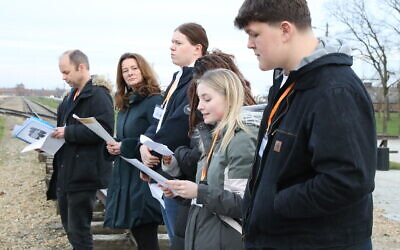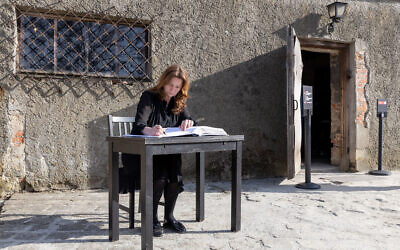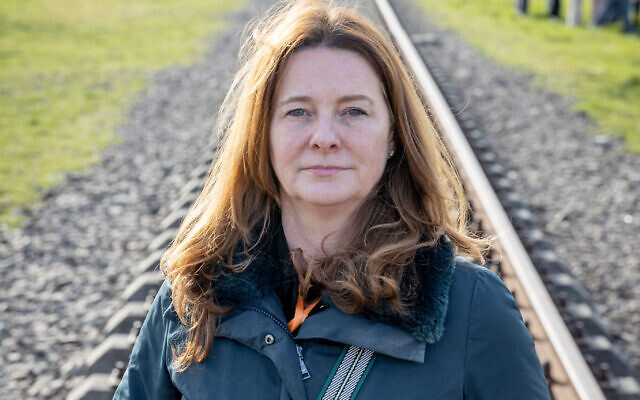Education secretary tells of ‘deeply moving and troubling’ Auschwitz visit
Gillian Keegan joins post-16 students from schools across the West Midlands on the trip as part of the Holocaust Educational Trust’s Lessons from Auschwitz Project
Lee Harpin is the Jewish News's political editor
Education secretary Gillian Keegan has described a visit this week to the former Nazi concentration and death camp Auschwitz-Birkenau as “deeply moving and troubling” and “something you have to experience first hand.”
She joined hundreds of post-16 students from schools across the West Midlands on Wednesday for an educational visit as part of the Holocaust Educational Trust’s (HET) Lessons from Auschwitz Project.
Speaking to Jewish media organisations about the experience immediately after she had returned to the UK, Keegan said: “It’s extraordinary and does hit you when you go and I think it’s something that you have to experience firsthand.
“You see something that was purpose built for the world, really for the destruction of millions of people, or hundreds of thousands of people.
“That really is, is quite shocking. I mean, it’s obviously very deeply moving, but also quite, quite incomprehensible still.
“Even though you know everything that’s happened, you’ve read all about it, you’ve seen it in movies. But actually seeing the scale of it for yourself was deeply, deeply moving and troubling.”

Keegan had pledged to make the trip to the death camp in her speech at last September’s HET fundraiser dinner in London.
No one would have predicted at the event that just one month later, Hamas would commit its October 7th massacre in Israel.
In the aftermath of the atrocity in Israel, Keegan said the Auschwitz trip “felt very poignant because for the first time in a long time, Jewish people in many countries, including in our country, are feeling threatened and scared and are feeling more subjected to levels of hatred that they never thought would be possible.”
Asked about the banners and placards repeatedly comparing Israeli actions against Hamas in Gaza with the Holocaust, Keegan rejected claims that this showed education around the causes of the Shoah was failing.
She said:”Yes, there are some groups on our streets. Obviously we’re not comfortable with what’s happening on our streets.
“And we must do everything to stamp it out. But I don’t think that means that Holocaust education is not being successful.”
Noting the alarming rise in antisemitism in schools and universities, Keegan stressed that in terms of holocaust education:”I wouldn’t say it’s been ineffective.”
Asked what she would say to those who continue to make the comparison between Gaza and the Holocaust she added:”We say clearly they are not comparable.
“Obviously there’s the discussions about the use of the word genocide, but clearly this is not comparable.
“Maybe that’s a reason more people do need to visit Auschwitz – anyone who sees the systematic design and build of death camps, and concentration camps with gas chambers,this is a very different thing.”
The minister revealed her visit to Auschwitz-Birkenau felt slightly different to an earlier one to Yad Vashem in Jerusalem.
“I also found that incredibly moving,” she said of the earlier visit to Israel.
“I was comparing the two experiences. Because i you are walking around and it’s a whole day of walking, it’s kind of a slower experience, the visit to Auschwitz. The visit to Yad Vashem really hits you, maybe because it’s the first time I’d been.
“It’s a very full on experience. I found that deeply distressing actually.”

Last week Jewish News reported on the fact that the government’s plan to invest £7 million into further antisemitism awareness training in the country’s schools had been “paused” over concerns about the process to choose the organisation involved in conducting the educational classes.
Keegan confirmed “it has only been paused to get the procurement right, not for any other reason.”
She said there was a desire to use the money as effectively as possible, and it would go towards “a number of things including helping teachers become more confident in talking about these issues.”
The Secretary of State added:”I think we must recognise not everybody is as confident about talking about these issues as you are.”
Money would also be directed at combating antisemitism in universities, she added.
“That’s something we are working on, “she said. “What we are looking to do is show this is what tackling antisemitism looks like. This is what good looks like.
“Most people want to do the right thing. It’s just knowing what the right thing is.”
Keegan also spoke of the need to end the wearing of political badges in schools, adding “sometimes they are being used for political activism.”
She praised the introduction of free speech legislation in higher education “in terms of making sure you get that balance, which is a tricky balance.”
Asked about concerns the legislation had only succeeded in causing a rise in antisemitic incidents on campuses, Keegan said:”Well, free speech is a pillar of our society. You don’t have to agree with everything you hear. Of course there’s a difference between that and harassment and hate speech.”
Praising the Secretary of State for making the visit to Auschwitz, Karen Pollock, CBE, the chief executive of HET said “The impact of visiting Auschwitz – the site where over a million Jewish men, women and children were murdered, can never be underestimated.
“By joining us on our Lessons from Auschwitz Project, the Secretary of State has demonstrated her personal commitment and support to ensure future generations continue to remember the Holocaust and the six million men, women and children murdered – just because they were Jewish.
We are very grateful for the continued support from the Department for Education which has allowed tens of thousands of young people from across the UK to see the site for themselves and become Ambassadors against antisemitism and hate.”

Thank you for helping to make Jewish News the leading source of news and opinion for the UK Jewish community. Today we're asking for your invaluable help to continue putting our community first in everything we do.
For as little as £5 a month you can help sustain the vital work we do in celebrating and standing up for Jewish life in Britain.
Jewish News holds our community together and keeps us connected. Like a synagogue, it’s where people turn to feel part of something bigger. It also proudly shows the rest of Britain the vibrancy and rich culture of modern Jewish life.
You can make a quick and easy one-off or monthly contribution of £5, £10, £20 or any other sum you’re comfortable with.
100% of your donation will help us continue celebrating our community, in all its dynamic diversity...
Engaging
Being a community platform means so much more than producing a newspaper and website. One of our proudest roles is media partnering with our invaluable charities to amplify the outstanding work they do to help us all.
Celebrating
There’s no shortage of oys in the world but Jewish News takes every opportunity to celebrate the joys too, through projects like Night of Heroes, 40 Under 40 and other compelling countdowns that make the community kvell with pride.
Pioneering
In the first collaboration between media outlets from different faiths, Jewish News worked with British Muslim TV and Church Times to produce a list of young activists leading the way on interfaith understanding.
Campaigning
Royal Mail issued a stamp honouring Holocaust hero Sir Nicholas Winton after a Jewish News campaign attracted more than 100,000 backers. Jewish Newsalso produces special editions of the paper highlighting pressing issues including mental health and Holocaust remembrance.
Easy access
In an age when news is readily accessible, Jewish News provides high-quality content free online and offline, removing any financial barriers to connecting people.
Voice of our community to wider society
The Jewish News team regularly appears on TV, radio and on the pages of the national press to comment on stories about the Jewish community. Easy access to the paper on the streets of London also means Jewish News provides an invaluable window into the community for the country at large.
We hope you agree all this is worth preserving.






















